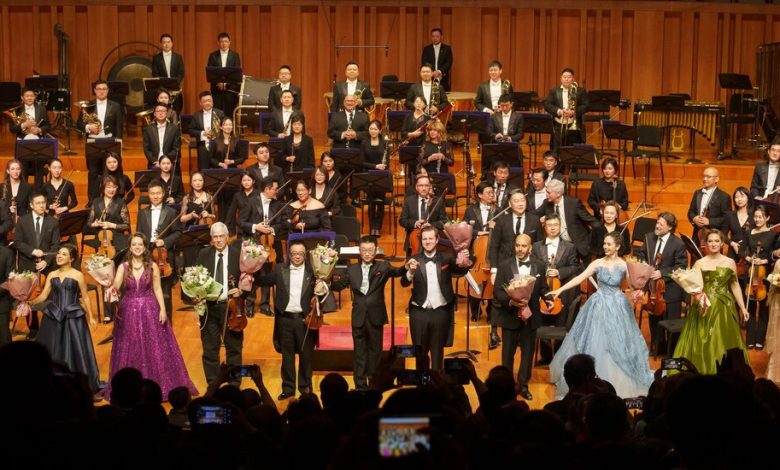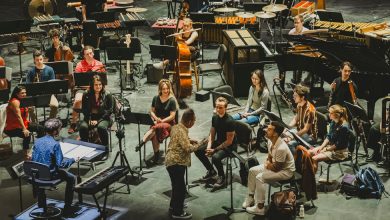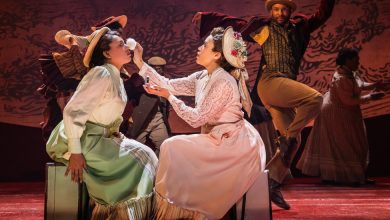As Leaders Meet, Musicians from Philadelphia Orchestra Tour China

President Biden and China’s leader, Xi Jinping, face a host of thorny geopolitical issues as they meet Wednesday in San Francisco: trade, Taiwan and the war between Israel and Hamas.
But they have found some common ground in the cultural sphere. Both leaders have in recent days praised the visit by a delegation of Philadelphia Orchestra musicians to China.
The musicians arrived there last week to mark the 50th anniversary of the orchestra’s celebrated 1973 visit to Beijing, when it became the first American ensemble to perform in Communist-led China as the two countries worked to re-establish official ties.
Now, with the relationship between the United States and China at its lowest point in four decades, their leaders have highlighted the role of music in easing tensions.
Mr. Biden said in a recent letter to the orchestra that its visit this month could help “forge even closer cultural ties, forever symbolizing the power of connection and collaboration.”
Mr. Xi, in a letter released on Friday, said the Philadelphia Orchestra had long played a role in strengthening the connection between the two countries, describing its 1973 visit as an “ice-breaking trip.”
“Music has the power to transcend borders,” he wrote, “and culture can build bridges between hearts.”
Daniel R. Russel, a former senior American diplomat now at the Asia Society Policy Institute, said that cultural exchange could build connections between China and the United States and help “refute political caricatures” that citizens of each country may hold.
But there are limits, he said, given the heated rhetoric and the increasingly intense rivalry between Beijing and Washington over national security and economic issues.
“It’s a very slender thread to use to knit together such a huge gash in the relationship,” he said.
On Friday, a dozen musicians from the Philadelphia Orchestra joined their counterparts from the China National Symphony Orchestra for a concert at the National Center for the Performing Arts in Beijing. The program included Beethoven’s Fifth Symphony, Leonard Bernstein’s overture from “Candide,” and Chinese folk songs.
“It was an incredibly impactful moment,” said Matías Tarnopolsky, the orchestra’s president and chief executive. “It had the effect of focusing the attention on the arts and culture and on the beauty and the power of music to effect change.”
The visit by the Philadelphia musicians, who are also traveling to Shanghai, Suzhou and Tianjin, has received wide attention in China. Many news outlets have in recent days published nostalgia-filled stories about the 1973 visit, during which the Philadelphia Orchestra, led by Eugene Ormandy, performed inside a packed hall in Beijing, a year after President Richard M. Nixon’s historic visit.
At the time, China was in the final years of the Cultural Revolution, during which most traditional music, including Western classical music, was banned. Jiang Qing, Mao Zedong’s wife, made sure that the concert — which featured a favorite work, Beethoven’s Sixth Symphony (known as the “Pastoral”) — was broadcast across the country.
The orchestra has been all over Chinese state media in recent days. An article about Mr. Xi’s letter to the orchestra appeared on Saturday’s front page of People’s Daily, the main newspaper of the Chinese Communist Party, just under the announcement that Mr. Xi would meet Mr. Biden in San Francisco. China Central Television, the state broadcaster, aired interviews showing Philadelphia Orchestra staff members and musicians praising Mr. Xi’s letter.
The focus on the orchestra’s visit reflects the Chinese government’s recent efforts to shore up its global image by emphasizing more personal ties, said David Bandurski, co-director of the China Media Project, an independent research program based in the United States.
“Emphasizing people-to-people exchanges is a way to stress the positives from the standpoint of China’s leadership,” he said. “They harken back also to an earlier time when Ping-Pong was sufficient to get both sides back to the table.”



